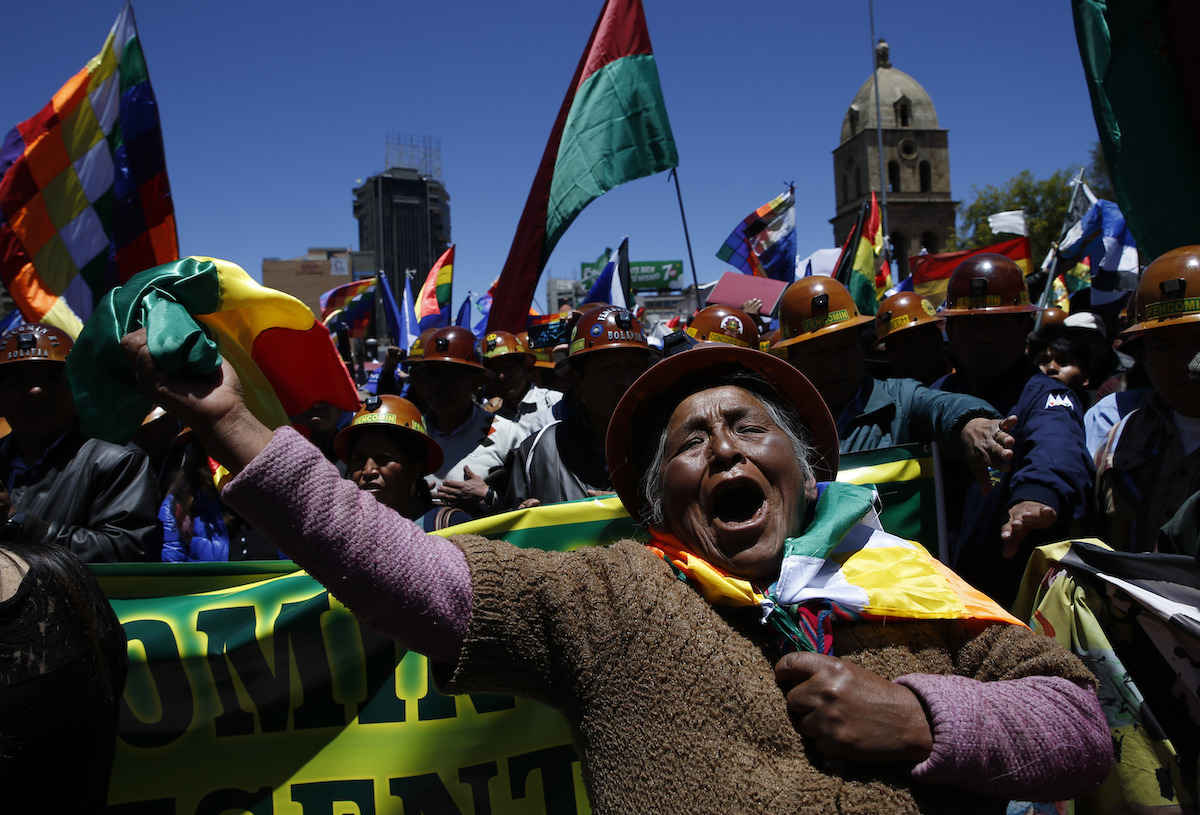

Bolivia’s President Evo Morales speaks during a press conference in La Paz, Bolivia, Thursday, Oct. 24, 2019. (AP Photo/Juan Karita)
By CARLOS VALDEZ, Associated Press
LA PAZ, Bolivia (AP) — Bolivia’s Evo Morales declared himself the outright winner of the country’s presidential election Thursday, giving him a fourth straight term in office following days of protests by both his opponents and supporters over accusations of vote fraud.
With more than 98 percent of the votes counted from Sunday’s election, Bolivia’s first indigenous president said he had the 10 percentage point lead over his nearest rival, former president Carlos Mesa, needed to win outright and avoid a second round runoff between the two.
“We have won in the first round. There are 1.58% [of the votes] left to count but we won with the rural vote,” Morales, the region’s longest ruling leader with 14 years in office, told a press conference.
Mesa announced that he would form an alliance to “defend the vote” in the streets and alleged that the leftist president had perpetrated “a monumental fraud” to get re-elected. Morales, in turn, urged his supporters to defend his win and denied electoral fraud, demanding his detractors show proof.
The Andean nation had been on a knife-edge since the bitterly disputed vote. If it had gone to a runoff between Morales and Mesa, analysts said a united opposition might have stood a chance of defeating the incumbent president.
As the morning broke, the official vote count gave Morales a 46.83% to 36.7% lead over Mesa.
International vote monitors have expressed concern at an earlier unexplained daylong gap in reporting results before a sudden spurt in Morales’ vote percentage. The Organization of American States has asked that the vote go to a second round because of the concerns—a request Morales rejected.
Opposition backers continued to stage rowdy protests, while Morales’ backers staged a march in the capital to show their support for the president.


Supporters of Bolivian President Evo Morales, who is running for a fourth term, shows his support during a march in La Paz, Bolivia, Wednesday, Oct. 23, 2019. (AP Photo/Juan Karita)
Protesters have burned Supreme Electoral Tribunal offices in three cities and staged demonstrations since Monday. The opposition bastion of Santa Cruz has seen two days of a partial strike “in defense of the vote and democracy.” On Thursday, Morales supporters announced marches in coca-growing region of Chapare, a bastion of support for the president.
Morales has repeatedly said he won outright and that his opponents are conspiring to oust him. He earlier said that a quick count of the vote also gave him a first round win.
“I want to denounce to the people and the world that a coup d’etat is underway,” Morales said at a news conference Wednesday. “The right wing has prepared it with international support.”
Morales did not specify where the alleged international support for the coup was coming from, but he regularly rails against U.S. imperialism in Latin America.


Protesters run away from tear gas fired by the police during an anti-government march against reelection of President Evo Morales gather outside the top electoral court to wait for the final results of last weekend’s presidential election in La Paz, Bolivia, Wednesday, Oct. 23, 2019. (AP Photo/Juan Karita)
Suspicions of electoral fraud rose when officials abruptly stopped releasing results from the quick count of votes hours after the polls closed Sunday with Morales topping the eight other candidates, but also falling several percentage points short of the percentage needed to avoid the first runoff in his nearly 14 years in power.
Twenty-four hours later, the body suddenly released an updated figure, with 95% of votes counted, showing Morales just 0.7 percentage point short of the 10-percentage point advantage needed to avoid a runoff.
That set off an uproar among the opposition and expressions of concern by international monitors.
The OAS observer mission asked for explanations and the European Union and the U.N. expressed concern about the electoral process and called for calm. The United States and Brazil, among others, also expressed concerns.
Michael G. Kozak, acting U.S. assistant secretary of state for the Western Hemisphere, warned Wednesday that Bolivian authorities will be held accountable if the process isn’t fair.
“I think you will see pretty strong response from the whole hemisphere, not just the U.S.,” Kozak said during a House hearing.
In Caracas, Venezuela’s socialist president, Nicolás Maduro, voiced support for his ally Morales.
“It is a coup d’etat foretold, sung and, one can say, defeated,” he said.


A mining woman supporter of Bolivian President Evo Morales, who is running for a fourth term, shows her support during a march in La Paz, Bolivia, Wednesday, Oct. 23, 2019. (AP Photo/Juan Karita)
The crisis was aggravated by the resignation of the vice president electoral council, Antonio Costas, who said he disagreed with the decision to interrupt transmission of the vote count.
Morales, 59, a native Aymara from Bolivia’s highlands, became the country’ first indigenous president in 2006 and easily won the two following elections amid more than a decade of a commodities-fed economic boom in South America’s poorest country. He paved roads, sent Bolivia’s first satellite to space and curbed inflation.
But he has faced growing dissatisfaction, especially over his refusal to accept the results of a 2016 referendum to keep limits on presidential terms. The country’s top court, considered by critics as friendly to the president, ruled that limits would violate Morales’ political rights as a citizen.
Being forced into a runoff would have been a sharp blow to Morales whose supporters had seemed confident of a first round win.


